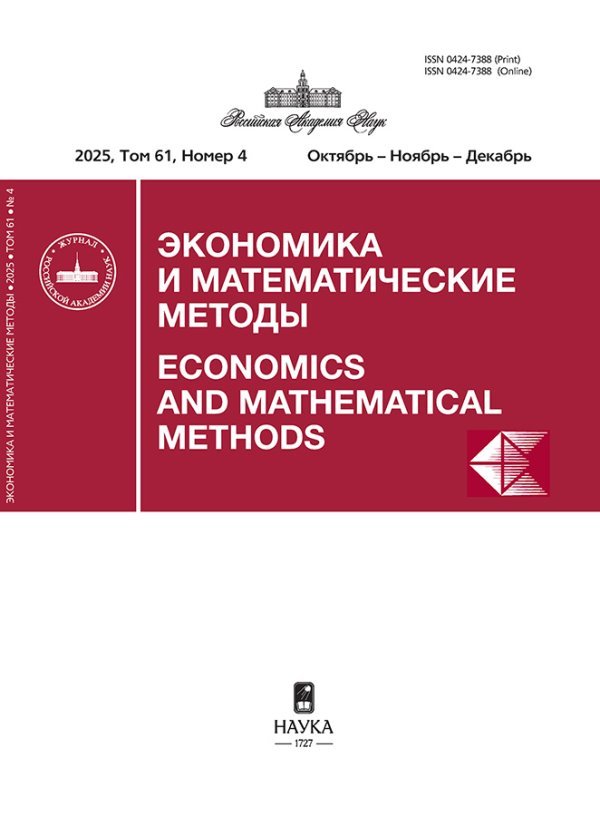The genesis of international banking regulation: A literature review using text analysis
- Authors: Fedorova E.A.1, Meshkova E.I.2, Nevredinov A.R.2
-
Affiliations:
- Financial University under the Government of the Russian Federation
- Bauman Moscow State Technical University
- Issue: Vol 60, No 1 (2024)
- Pages: 31-45
- Section: World economy
- URL: https://gynecology.orscience.ru/0424-7388/article/view/653310
- DOI: https://doi.org/10.31857/S0424738824010033
- ID: 653310
Cite item
Abstract
This paper reviews the publications on the development of banking regulation and identifies the major topics within this research area. The aim of this study is to summarize the empirical evidence of the academic literature on banking regulation for the last 30 years. For the systematic review we use a range of databases. To reach this aim we combine the elements of technical text analysis and method of expert assessment. To identify the major topics within the research area of banking regulation we develop a complex methodology based on text analysis which includes: principal component analysis, clustering, social network analysis. This approach differentiates our study from the similar ones. The primary result is a systematic review of academic literature that estimates the outcomes of banking regulation from Basel I to Basel III. Using a variety of methods we not only identify the key topics but also systematized the findings according to each topic. The implementation of the BCBS Agreements (Basel I–III) helped to improve financial stability and reduce the probability of banks’ default. At the same time, the analysis showed, in general, a negative assessment of the impact of capital adequacy regulation on the lending activity of banks, on the bank interest margin and, accordingly, the efficiency of banking activities. In some cases, it is confirmed that the increase in market discipline and the expansion of the supervisory powers of the authorities (Basel II) leads to an increase in banking efficiency. The study contributes to the existing literature in several aspects. 1. We cover various aspects of estimation of banking regulation development, namely, its impact on the financial stability of banks, on their lending activity and efficiency. 2. The study covers a broad range of publications over the last 30 years including highly-cited papers as well as the recent articles. We examine the issues dynamically: from Basel I to Basel III. 3. We use text analysis to identify and systematize the key topics within the selected research area and to evaluate the empirical evidence.
Keywords
Full Text
About the authors
E. A. Fedorova
Financial University under the Government of the Russian Federation
Author for correspondence.
Email: ecolena@mail.ru
Russian Federation, 125167, Moscow
E. I. Meshkova
Bauman Moscow State Technical University
Email: eimeshkova@fa.ru
Russian Federation, Moscow
A. R. Nevredinov
Bauman Moscow State Technical University
Email: a.r.nevredinov@gmail.com
Russian Federation, Moscow
References
- Abreu E. S. de, Kimura H., Sobreiro V. A. (2019). What is going on with studies on banking efficiency? Research in International Business and Finance, 47, 195–219. doi: 10.1016/j.ribaf.2018.07.010
- Acosta-Smith J., Grill M., Lang J. H. (2020). The leverage ratio, risk-taking and bank stability. Journal of Financial Stability, 100833. doi: 10.1016/j.jfs.2020.100833
- Agoraki M. E. K., Kouretas G. P. (2021). Loan growth, ownership, and regulation in the European banking sector: Old versus new banking landscape. Journal of International Financial Markets, Institutions and Money, 75, 101450. doi: 10.1016/j.intfin.2021.101450
- Alam N., Binti Zainuddin S. S., Rizvi S. A.R. (2019). Ramifications of varying banking regulations on performance of Islamic Banks. Borsa Istanbul Review, 19 (1), 49–64. doi: 10.1016/j.bir.2018.05.005
- Almenberg J., Andersson M., Buncic D., Cella C., Giordani P., Grodecka A., Roszbach K., Soderberg G. (2017). Appropriate capital ratios in major Swedish banks. New Perspectives. Sveriges Riksbank Staff Memo, 170519. Available at: https://www.riksbank.se/globalassets/media/rapporter/staff-memo/engelska/2017/staff_memo_170519_eng.pdf
- Anagnostopoulos Y., Kabeega J. (2019). Insider perspectives on European banking challenges in the post-crisis regulation environment. Journal of Banking Regulation, 20 (2), 136–158. doi: 10.1057/s41261-018-0076-1
- Bace E., Ferreira A. (2020). Regulation’s influence on EU banking efficiency: An evaluation post crisis. Cogent Economics and Finance, l.8 (1), 1–20. doi: 10.1080/23322039.2020.1838735
- Barrell R., Davis E. P., Karim D., Liadze I. (2010). Bank regulation, property prices and early warning systems for banking crises in OECD countries. Journal of Banking and Finance, 34 (9), 2255–2264. doi: 10.1016/j.jbankfin.2010.02.015
- Barth J. R., Miller S. M. (2018). Benefits and costs of a higher bank “leverage ratio”. J. Financ. Stabil., 38, 37–52.
- Berger A. N., Bouwman C. H. (2013). How does capital affect bank performance during financial crises? J. Financ. Econ., 109 (1), 146–176.
- Berger A. N., Molyneux P., Wilsone J. O.S. (2020). Banks and the real economy: An assessment of the research. Journal of Corporate Finance, 62, 101513. doi: 10.1016/j.jcorpfin.2019.101513
- Boissay F., Cantú C., Claessens S., Villegas A. (2019). Impact of financial regulations: Insights from an online repository of studies. BIS Quarterly Review, 53–68.
- Bougioukas K. I., Vounzoulaki E., Mantsiou C. D., Papanastasiou G. D., Savvides, E.D., Ntzani E. E., Haidichet A.-B. (2021). Global mapping of overviews of systematic reviews in healthcare published between 2000 and 2020: A bibliometric analysis. Journal of Clinical Epidemiology, 137, 58–72. doi: 10.1016/j.jclinepi.2021.03.019
- Boukus E., Rosenberg J. (2006). The information content of FOMC minutes. SSRN Electronic Journal, 10.2139/ssrn.922312
- Camacho-Collados J., Pilevar M. T. (2018). From word to sense embeddings: A survey on vector representations of meaning. Journal of Artificial Intelligence Research, 63, 743–788. doi: 10.1613/jair.1.11259
- Cardot-Martin R., Labondance F., Refait-Alexandre C. (2021). Capital ratios and banking crises in the European Union. International Economics Journal. doi: 10.1016/j.inteco.2021.07.003
- Chang C.-P., Lin J.-H. (2011). Optimal bank interest margin with synergy banking under capital regulation and deposit insurance: A swaption approach. Review of Pacific Basin Financial Markets and Policies, 14 (2), 327–346.
- Christopoulos D., Quaglia L. (2009). Network constraints in EU banking regulation: The capital requirements directive. Journal of Public Policy, 29 (20), 179–200. doi: 10.1017/S0143814X09001068
- Fratzscher M., König P. J., Lambert C. (2016). Credit provision and banking stability after the Great Financial Crisis: The role of bank regulation and the quality of governance. Journal of International Money and Finance, 66, 113– 135. doi: 10.1016/j.jimonfin.2016.02.015
- Gavalas D. (2015). How do banks perform under Basel III? Tracing lending rates and loan quantity. Journal of Economics and Business, 81, 21–37. doi: 10.1016/j.jeconbus.2015.05.003
- Gomes D. S.M. da, Cordeiro F. C., Consoli B. S., Santos N. L., Moreira V. P., Vieira R., Moraes S., Evsukoff A. G. (2021). Portuguese word embeddings for the oil and gas industry: Development and evaluation. Computers in Industry, 124. doi: 10.1016/j.compind.2020.103347
- Hinton G. E., Roweis S. T. (2022). Stochastic neighbor embedding, advances in neural information processing systems. Cambridge: The MIT Press, 833–840.
- Jorda J. R., Richter B., Schularick M., Taylor A. M. (2021). Bank capital redux: Solvency, liquidity, and crisis. Rev. Econ. Stud., 88 (1), 260–286.
- Kim D., Santomero A. M. (1988). Risk in banking and capital regulation. The Journal of Finance, 43 (5), 1219–1233.
- King M. R. (2013). The Basel III net stable funding ratio and bank net interest margins. Journal of Banking & Finance, 37, 4144–4156. doi: 10.1016/j.jbankfin.2013.07.01
- Klomp J., Haan J. D. (2012). Banking risk and regulation: Does one size fit all? Journal of Banking and Finance, 36 (12), 3197–3212. doi: 10.1016/j.jbankfin.2011.10.006
- Lefebvrea J. S., Blooma G. A., Loughead T. M. (2020). A citation network analysis of career-mentoring across disciplines: A roadmap for mentoring research in sport. Psychology of Sport and Exercise, 49. doi: 10.1016/j.psychsport.2020.101676
- Li X., Lin J.-H., Huang F.-W. (2019). Optimal bank interest margin under capital regulation: Regret aversion and shadow banking. International Journal of Information and Management Sciences, 30 (2), 169–184. doi: 10.6186/IJIMS.201906 30 (2).0005
- Mikolov T., Sutskever I., Chen K., Corrado G. S., Dean J. (2013). Distributed representations of words and phrases and their compositionality Proceedings of the 26th International Conference on Neural Information Processing Systems, 2, 3111–3119.
- Moro S., Cortez P., Rita P. (2015). Business intelligence in banking: A literature analysis from 2002 to 2013 using text mining and latent Dirichlet allocation. Expert Systems with Applications, 42 (3), 1314–1324. doi: 10.1016/j.eswa.2014.09.024
- Oliveira V. B., Raposo C. (2020). How did regulation and market discipline influence banking distress in Europe? Lessons from the global financial crisis. Studies in Economics and Finance, 37 (1), 160–198. doi: 10.1108/SEF-03-2019-0123
- Ozili P. K., Outa E. (2017). Bank loan loss provisions research: A review. Borsa Istanbul Review, 17 (3), 144–163. doi: 10.1016/j.bir.2017.05.001
- Pasiouras F., Tanna S., Zopounidis S. (2009). The impact of banking regulations on banks’ cost and profit efficiency: Cross-country evidence. International Review of Financial Analysis, 18, 294–302. doi: 10.1016/j.irfa.2009.07.003
- Romero-Silva R., Leeuw S. de (2021). Learning from the past to shape the future: A comprehensive text mining analysis of OR/MS reviews. Omega, 100, 1–26. doi: 10.1016/j.omega.2020.102388
- Roulet C. (2018). Basel III: Effects of capital and liquidity regulations on European bank lending. Journal of Economics and Business, 95, 26–46. doi: 10.1016/j.jeconbus.2017.10.001
- Saqr M., Alamro A. (2019). The role of social network analysis as a learning analytics tool in online problem based learning. BMC Medical Education, 19. doi: 10.1186/s12909-019-1599-6
- Scannella E. (2016). Theory and regulation of liquidity risk management in banking. International Journal of Risk Assessment and Management, 19, 4–12. doi: 10.1504/IJRAM.2016.074433
- Tsai J. Y. (2012). Risk and regret aversions on optimal bank interest margin under capital regulation. Economic Modelling, 29 (6), 2190–2197. doi: 10.1016/j.econmod.2012.06.028
- Van der Maaten L., Hinton G. (2008). Visualizing data using t-SNE. Journal of Machine Learning Research, 9, 2579–2605.
- Van Hoose D. (2007). Theories of bank behavior under capital regulation. Journal of Banking and Finance, 31 (12), 3680–3697. doi: 10.1016/j.jbankfin.2007.01.015
- Williams R. A. (2009). Exogenous shocks in subsystem adjustment and policy change: The credit crunch and Canadian banking regulation. Journal of Public Policy, 29 (1), 29–53. doi: 10.1017/S0143814X09001007
- Zhang D., Cai J., Dickinson D. G., Kutan A. M. (2016). Non-performing loans, moral hazard and regulation of the Chinese commercial banking system. Journal of Banking and Finance, 63, 48–60. doi: 10.1016/j.jbankfin.2015.11.010
- Zhang M., Palade V., Yan W., Zhicheng J. (2021). Attention-based word embeddings using artificial bee colony algorithm for aspect-level sentiment classification. Information Sciences, 545, 713–738. DOI: doi: 10.1016/j.ins.2020.09.038
Supplementary files














